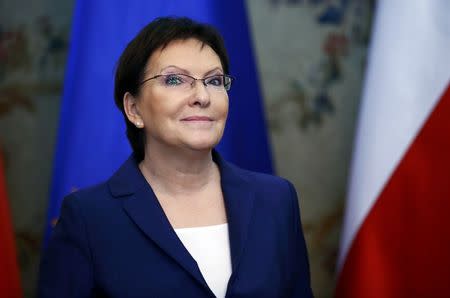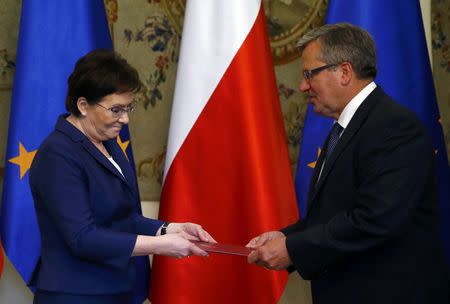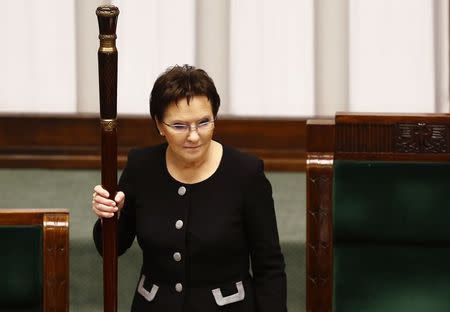First task for Poland's new PM: avoid a mutiny in the ranks
By Pawel Sobczak and Wiktor Szary WARSAW (Reuters) - The most urgent task in Polish prime minister-designate Ewa Kopacz's in-tray is to deal with an internal challenge to her leadership that, if mishandled, could bring down the government in eastern Europe's biggest economic power. Kopacz must find a way to persuade Grzegorz Schetyna -- a long-time rival inside the ruling Civic Platform -- to fall back into line, without pushing him into leaving the party before next year’s election. “It’s a low blow, struck at a time when Ewa needs to focus on leading the government,” a senior Civic Platform figure who is close to Kopacz said of Schetyna’s announcement last Tuesday that he will seek the party leadership. Kopacz, the speaker of parliament, was anointed by her center-right party to take over as prime minister from Donald Tusk, who has been appointed as chief of the European Council. She is expected to start her new job next week. Schetyna tried several times to challenge Tusk but was sidelined. When he lost his job as speaker of parliament, it was Kopacz who replaced him, and later she took his job as the Civic Platform’s first deputy leader. If Schetyna goes ahead with his leadership bid, that would undermine Kopacz, as the prime minister by tradition also heads the party. The worst case scenario, though unlikely, is that Schetyna and his faction quit the party, wiping out the governing coalition's majority and forcing an early election. Resolving this sort of awkward conundrum was Tusk's forte. He clocked up a record seven years in office by using skilful diplomacy to keep warring factions in his own party at bay. Investors poured billions of dollars into Poland after Tusk broke a long cycle of short-lived governments, creating political stability, and they are watching closely - wary of a return to the bad old days. Kopacz, 57, has a different personality to Tusk. According to people who have worked with her, she is blunt and prone to displays of anger if things do not go her way. “The Prime Minister (Tusk) definitely has more finesse,” said a source who worked with Kopacz in her previous role as health minister. “Ewa can’t charm like that ... she is definitely more direct” said the source, noting that Kopacz had been an effective minister. COMPROMISE DEAL On the policy front, Kopacz is not facing any major difficulties. She has said she will focus on implementing the agenda set out by Tusk, her mentor. Government finances are stable, the economy is in a slow but steady recovery, and there are no big initiatives planned between now and the next election. Continuity in economic policy will be assured by Jan Krzysztof Bielecki, who was the senior economic advisor to Tusk and is likely to perform a similar, or perhaps even more prominent, role under Kopacz. Keeping her party together may be a greater challenge. A senior ally of Schetyna inside Civic Platform, speaking on condition of anonymity, acknowledged that “it will be a difficult time” but he did not think the party would split. Leading party figures say they hope a compromise can be reached by giving important posts to Schetyna and his faction in the new cabinet which Kopacz is pulling together. “She’s a skilful politician. I don’t rule out close cooperation with people from that camp,” said the senior Civic Platform source who is close to Kopacz. TUSK'S PROTEGE In her career so far, Kopacz has moved in Tusk’s shadow. She is a doctor by profession and when she first entered parliament in 2001, other lawmakers sought her out for advice on ailments, and for prescriptions. When Tusk’s sister Sonia suffered a serious stroke, Kopacz became involved in her treatment, Polish media have reported, even accompanying her in an ambulance between hospitals and eventually to Berlin, where Sonia underwent surgery. When Tusk became prime minister in 2007, he made Kopacz health minister. One of her decisions in that post suggested though that she was more than just Tusk's protégé. A year after Kopacz became a minister, a 14-year-old girl and her mother went to hospital in Lublin, south-eastern Poland, to ask for an abortion. She was legally eligible for an abortion, according to the European Court of Human Rights, because she was pregnant after being raped. But, in staunchly Roman Catholic Poland, she was refused an abortion in several hospitals in Lublin and Warsaw, and confidential details of her case were continually leaked to anti-abortion activists who followed her around the country. The abortion was performed after Kopacz’s ministry sent a car to drive the girl and her mother secretly to Gdansk where officials had arranged for the procedure to be carried out. Afterwards, some Catholic clergymen said that Kopacz should be excommunicated. More liberal Poles saw the episode as evidence that Kopacz was a woman of principle. (Writing by Christian Lowe; Editing by Louise Ireland)





